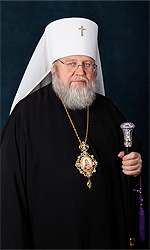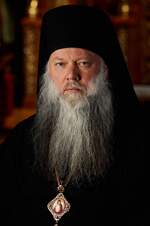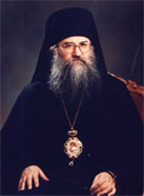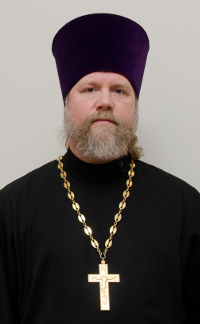
Metropolitan HILARION, Eastern America and New York Diocese,
FIRST HIERARCH of the Russian Orthodox Church Outside of Russia.
75 E. 93rd Street
New York, NY 10128

Most Reverend PETER, Archbishop of Chicago and Mid-America.
Administrator of Chicago and Mid-America Diocese
P.O. Box 1367
Des Plaines, IL 60017 USA
Tel.: (847) 298-5383/Fax: (847) 298-5380
Diocesan Office Tel.: (847) 373-4002
e-mail: bppeterchicago@gmail.com

Most Rev. Alypy, Archbishop of Chicago & Mid-America (retired)
1800 Lee Street
Des Plaines, IL 60018, U.S.A.
Tel: (847) 824-6531; fax: (847) 759-9836
_______________________________________________________________________________________________________________________________
V Rev Gregory Joyce, Founding Rector / Spiritual Advisor
Fr. Gregory was born on October 6, 1968 in Columbia, MO to Dr. B. Patrick Joyce and Katherine Joyce (Grigorieff). He is the first of two children (his sister, Anna, was a parishioner of St. Vladimir’s during her school years at the University of Michigan). Fr. Gregory’s family moved to Houghton, MI in the early 1970s. His father is an Emeritus Professor of Economics at Michigan Technological University there, while his mother is a retired X-Ray Technician. Fr. Gregory completed his elementary and secondary education in the Houghton-Portage Township school system, occupying himself more with sports than with academic pursuits. Despite this, following his graduation from Houghton High School he was accepted at the University of Michigan, where he graduated with a BA in Education in 1992. On August 8th of that year he married Beth Balma (of Hancock, MI). The new couple spent a year in Ann Arbor as Fr. Gregory studied in the intensive Russian language program of the University of Michigan Residential College. In 1993 he was accepted at Holy Trinity Monastery in Jordanville, NY. In 1994 he was ordained a Deacon by then Archbishop Laurus (the later First Hierarch of the Russian Orthodox Church Outside of Russia). On St. George’s Day (April 23/May 6) of 1995 he was ordained a priest, again by Archbishop Laurus. Fr. Gregory served at Holy Trinity Monastery on the clerical staff and taught English and English as a Second Language at Holy Trinity Monastery during the academic year 1995-96. He received his Pastoral Theological Certificate from Holy Trinity Monastery in 1996. Later that same year Fr. Gregory was appointed Rector of St. Vladimir’s Church by Archbishop Alypy.
In 2001 Fr. Gregory received his MA in Education from the University of Michigan. In 2008 Fr. Gregory was accepted into the Doctorate of Ministry program at Pittsburgh Theological Seminary and in 2009 appointed Assistant Dean of the Pastoral School of the Diocese of Chicago & Mid-America. In 2013 Fr. Gregory completed his Doctoral Degree and was appointed Associate Dean of the Pastoral School. Fr. Gregory and Matushka Elizabeth make their home in Saline, MI with their three children: Maria (born August 12, 1999), Michael (born May 4, 2002), and Natalia (born April 16, 2006). In addition to being the Rector of St. Vladimir’s Fr. Gregory is the Secretary of the Diocese of Chicago & Mid-America, the Dean of the Michigan parishes of the Diocese of Chicago & Mid-America, the acting Rector of St. Seraphim Mission in Okemos, MI, and an instructor in the Pastoral School of the Diocese of Chicago & Mid-America.
.
__________________________________________________________
From the Archives:
.

With the blessing of His Grace Bishop Peter of Cleveland, Administrator of the Diocese of Chicago Mid-America, Protopriest Gregory Joyce, Rector of St Vladimir Church of the Russian Orthodox Church Outside of Russia in Ann Arbor, MI, visited the Metropoliate of Novosibirsk.
The priest came to Siberia to gather data for his dissertation on the use by priests of various forms and methods of obtaining information on other religions for their discussions with parishioners. This research had already been conducted among American priests previously. Fr Gregory visited His Eminence Metropolitan Tikhon of Novosibirsk and Berd and received his blessing to work with the priests of his Metropoliate.
During his visit to Siberia, Fr Gregory met with Mr Oleg Zaev, Director of the Information Consultancy Center on Sects at the Cathedral of St Alexander Nevsky. We offer our readers selections from their conversation:
-What is life like in the Russian Orthodox Church Outside of Russia since the reunification of the Churches in 2007?
- First of all, we are very happy that we were able to conclude the process of reconciliation. Finally we can work together with our brothers and sisters in Christ from Russia, even on an academic level My visit here is a direct result of the reconciliation, without which my trip would have been impossible.
The Russian Orthodox Church Outside of Russia always existed as a temporary entity, but people began to forget about this temporary status over time. The greatest task we faced within the Church before reconciliation was to explain to people that the time had come to change this temporary status. We needed to help our parishioners understand how important this process was. Our diocese may be different from others in that we started preparing people for reunification earlier, since we believed that sooner rather than later it needed to occur. Since the early 2000s, we would regularly publish the decisions of our pastoral conferences in which we stated the necessity of moving actively towards canonical communion. I must say that when we just began to talk about it, many parishioners admitted that they anticipated this conversation and understood how important it was and were quite ready to accept that the time had fully come to end the temporary status of the Russian Church Outside of Russia.
In our diocese, the number of parishes which did not support reconciliation and that did not join in the fullness of the Church is thankfully small. Out of about fifty clergymen in our diocese, we only lost one priest and one deacon. Individual parishioners left their parishes, but those were also thankfully few. The exception is the South American Diocese. The statistics there are different and they have had a great struggle with the reconciliation for various reasons. Still, we aren’t abandoning our efforts to persuade all those who have left the Church to reconsider their actions.
- How many Orthodox Christians live in America?
- We don’t have exact numbers since religious statistics of these sorts are not tracked by the government. We generally consider that not more than one percent of Americans are Orthodox Christians. This means that in the United States, there are about 3 million Orthodox Christians at most. They include Russians, Arabs, Bulgarians, Romanians, Serbs, that is, representatives of those nations which historically bore the Orthodox culture, and of course, many Native Americans.
But we are conscious of the fact that we are a religious minority.
In America, people speak openly and eagerly about religion. This is a special characteristic of the American people. That doesn’t necessarily mean serious, profound discussions of matters of faith. People walking to the grocery store, or taking a walk, are genuinely interested in what church their friends go, what their faith is about, which religion they confess, etc. The overwhelming majority of Americans consider themselves religious, even if they don’t attend church. This allows us to talk to them freely about our Orthodox Faith.
There are many problems which force a person to think about faith in America. But why people come to the Orthodox Church from other religious confessions, even non-Christian faiths, is a separate matter. Partly it can be answered by the fact that people seek a more profound understanding and expression of their faith. Those who come to the Orthodox Church often say that they finally feel at home, and have found the place they had sought all along – even if they did not even understand they were seeking it.
- You said that Americans consider themselves religious. But if this is so, how can you explain the organized parades through the streets of your cities of representatives of sexual minorities? From the point of view of any religion, sexual deviancy is a sin.
- A more pressing issue for Americans than gay parades are same-sex marriages. Public discussion of this topic is ongoing, and has been couched as a continuation of the discussion on inter-racial marriage begun many decades ago. That is why the Church is not invited to enter into these debates, because they are not tied to theological research on the subject and so they are discussed as exclusively a matter of human rights – not as a moral question. That is, much of the American public considers that they lie on entirely different planes. This doesn’t mean that the Church remains silent. We try to address society on this topic, but the problem is that society is not seeking commentary from the Church on the subject.
- In your dissertation, you study the question of how Orthodox priests talk about other beliefs with their parishioners, what methods they use. This could lead to the problem of an inaccurate or one-sided message designed to draw people to their side. Do you agree?
- Yes, this is a problem every priest faces. How is one to speak the absolute truth? It seems to me that such discussions cannot become dry recitations from textbooks. At the same time, one cannot diminish the importance of other religions, but one must explain the substance of other faiths from the point of view of Orthodoxy. We clergymen cannot simply think for the Orthodox Christian, we must give him as much accurate information as possible from the Orthodox point of view, and let him decide for himself. For example, I first explain another religion through the prism of Orthodoxy, then I invite questions.
- Many people living in Russia are suspicious of Islam, sensing a certain danger in it. Do you address this in your parish? Or is it unimportant for you?
- I live in one of the suburbs of Detroit, where many Muslims live. They are good neighbors. It is important to understand that the danger comes from extremist groups, which are a small minority. That is why when discussing Islam in our parish, we take as a basis the history of this religion: how it originated, how it developed. Naturally, we touch upon the persecution of Christians during the Caliphate period. This is necessary in order to make sure the Orthodox Christian is prepared to talk to his Muslim neighbors with accurate information as a basis of these discussions. We teach our parishioners that we are missionaries in America. And as real missionaries, we must live an exemplary Orthodox life – we must be examples of Christian love. When we preach Christian love in the world through the example of our own Christian witness, this can become the basis of possible theological discussions.
- Destructive cults exist in both America and Russia. Do you agree that this is a serious problem in your society?
- It is a very serious problem for every family which has a member who is drawn into such a destructive group. But you can’t say that such matters are discussed in great depth in our society or in our government. For instance, the Church of Scientology is banned in certain European countries, but in America it is not. The government only takes action when sects violate the law. This includes kidnapping, child abuse, tax evasion, etc.
- What is the level of occultism and neo-paganism in America?
- There is occultism, of course, but its effect on society is somewhat small. Maybe for some, astrology and neo-paganism have become a part of their lives, but they still don’t comprise the main part of their lives. Another thing is much more concerning for me. The occult or neo-pagan practices, horoscopes and the like are treated as just a game by many, but this quality makes these amusements that much more dangerous. People don’t take into account that these games can contain something very serious and spiritually dangerous. We warn our parishioners about this, we tell them that it is unacceptable for a Christian to be involved in these things.
- Fr Gregory, you are the Rector of St Vladimir Church in Ann Arbor. Tell us about your parish.
- About 60 percent of our parishioners have a Slavic background. Of these 60 percent, 40 percent are emigres from the former Soviet Union, the remaining 20 percent are of the second, third and even fourth generation of immigrants. The other 40 percent of our parishioners are without any Orthodox ethnic background. I belong to the second generation of Russian immigrants. My wife, however, is a convert to the Orthodox faith.
Last year our parish celebrated its thirtieth anniversary. It was founded in 1981 by nine families. At first, services were held in the basement of a Catholic church, then the parishioners bought a garage, which they rebuilt as a church. Five years ago we expanded our building, thanks to which the church has more space and more light. Now, with God’s help, we are preparing and hoping to build a new church.
- Fr Gregory, on Sunday you celebrated Divine Liturgy in St Alexander Cathedral. There were a lot of little children in church whom their parents brought to Communion. Does your parish have a lot of children?
- Yes, our parish has a lot of young families with children. We have a Sunday school for the children, and a parish summer camp. Our youth groups are very active also. I believe these activities contribute to our church attracting young people.
Dmitry Kokoulin
.
.
Glory to Jesus Christ!
Hello Everyone,
With our 7th Anniversary passing recently, I am so proud to report that this has been a very exciting year for our mission and with God's help, the future looks even brighter!
All of this is not to say that we don't need each other and every one of us have to continue to work hard to bring Orthodox Christianity to the Dearborn/Downriver area. It will take the sincere efforts of each and every one of us, along with the Lord's blessing, to be successful as a parish community - to continue to allow us the great honor of bringing more of our friends and loved ones to HIS church, and continue to allow us to strengthen ourselves in our faith in Him and our service to Him!
In a time of such uncertainty, and the changing landscapes that is challenging our brothers and sisters, especially for those who maybe are, or have lost their spiritual homes, we promise to work diligently - with love and respect and the humble abilities of our faithful to provide support to our Lost Sheep (new and old) and to invite all of you into our lives and share our community.
With God, ALL things are possible, and with the love and strength of our community, we will be there for you! It is my sincere hope that this would be the last year that we celebrate scattered about in different places and parishes and the next year we will all be together in one place - a parish church our Lord will have entrusted to us as we celebrate all of our Christian Sacraments and Holy Days.
May the merciful Lord grant it - and with Love in our Lord!
Glory Forever!
Very Reverend Father Gregory Joyce
Editor's Note:
We are truly blessed that our Archbishop PETER has seen the potential for growth in our area and has enhanced us by allowing our Fr. Gregory Joyce to be our Rector for the foreseeable future. Fr. Gregory has worked so unselfishly with us developing our mission direction and is always there when we need him. Because of his generosity and faith in our community, we Thank God every day that he is our shepherd.
.


 Orthodoxy in America
Orthodoxy in America

